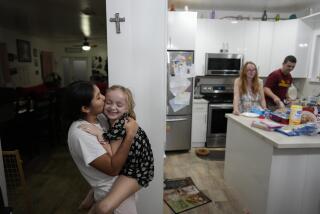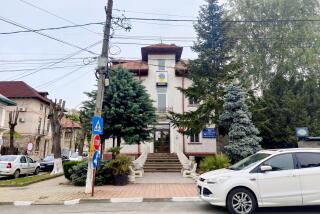From U.S., Help for Romanian Orphans
- Share via
LOS ANGELES — New mom Joan Conway is glad she didn’t hear all of those worrisome tales about dysfunctional children and stressed-out families 16 months ago.
Otherwise she might not have found herself earlier this month in a tiny Sherman Oaks restaurant with plates of tarama caviar and kelte meatballs in front of her--and with a bright-eyed boy named Patrick bouncing on her lap to the beat of Romanian folk music.
Conway was among 80 adoptive parents of Romanian orphans who gathered to help launch a new Chatsworth-based nonprofit foundation that seeks to help children who remain in that country’s infamous orphanages.
The luncheon at the Cafe Maria restaurant was something of a coming-out party for both newly adopted Romanian children and their parents.
News accounts telling of psychological problems faced by some Romanian orphans after years of harsh institutional living have caused some potential parents to have second thoughts about adopting from that country.
To her relief, Conway, a former Santa Barbara college instructor, didn’t learn of those stories until well after she returned to the United States with her new son. And after he passed routine pediatric testing here with flying colors.
“I heard the horror stories when I came back from Romania,” Conway said. “At first I thought, ‘Oh, my, I’d better have him reevaluated.’ But then I thought, ‘Thank God I didn’t hear these things before I went over there.’ ”
Parents at the luncheon said the outlook for Romanian orphans has improved since the 1989 fall of dictator Nicolae Ceausescu made the world aware of the more than 200,000 children being warehoused in state-run institutions.
Newspaper stories and television reports in the early 1990s depicted the orphanages as jammed with diseased and severely damaged children. The crowded institutions were characterized by one Western expert as “pediatric gulags . . . concentration camps for babies” who were receiving little individual attention.
Earlier this year, Canadian researchers released a study that found that 65% of the first Romanian orphans to come to Canada were so psychologically troubled that a third of the adoptive parents became depressed and started to feel like failures.
That’s not the case these days, said Shelli Becker, the Altadena mother of twin 2 1/2-year-olds who came to the United States in August 1996.
“My family was scared for me because you don’t know the history of children like these,” said Becker, a business analyst. Although both Emily and Michaela were small for their ages and Emily had battled pneumonia for more than half of her 17-month life when Becker adopted them, they are thriving now, she said.
Marlene Handler, an ad agency controller from West Hollywood, decided to ignore what she also calls “the horror stories” three months ago when she adopted her son, Leo. At first, the boy couldn’t walk, talk or eat solid foods. But now the 16-month-old is quickly catching up, she said.
*
Those early Romanian adoption stories shouldn’t scare away prospective parents, said Jeannie Wrightson, a Woodland Hills psychologist whose daughter Elena Amalia is a playful, laughing 2 1/2-year-old.
She said American adoption services, such as Chatsworth-based Bal Jagat-Children’s World, Inc., which she utilized, helps match parents with Romanian children and prepare them for what to expect back in the United States.
“Our daughter is a joy and a blessing,” said her father, Skip Wrightson.
The luncheon--which featured a performance by a children’s dance group from a Romanian Orthodox church--raised about $3,000. The money will be used to hire additional workers at Romanian orphanages where children still outnumber care-givers by as much as 26-to-1.
Only a small proportion of the children in Romania’s 300 or so orphanages will ever find permanent homes, said Luisa Barajas, a Sylmar social worker who adopted her 21-month-old daughter, Lia, from a Brasov, Romania, orphanage a year ago.
Barajas helped organize Copii Lumii, the foundation that sponsored the luncheon, and serves as the 4-month-old group’s president.
“Our kids will make it,” Barajas said of the children laughing and playing in the restaurant. “But not all of the kids over there will make it.”
More to Read
Sign up for Essential California
The most important California stories and recommendations in your inbox every morning.
You may occasionally receive promotional content from the Los Angeles Times.











